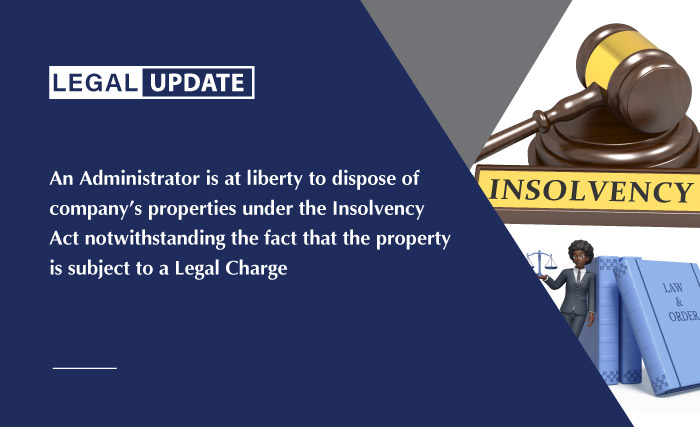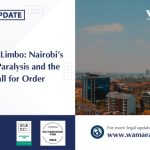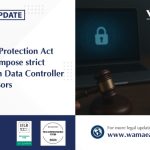Introduction
Justice A. Visram has held that there are no barricades in law that prevent banks from pursuing the provisions of the Insolvency Act during the realization process. In the well-reasoned ruling, the judge succinctly stated that Sections 580 to 587 of the Insolvency Act grants an Administrator the power to sell property of a company as if it were not subject to a charge.
It is now trite law that financiers are at liberty to exercise any of the optional self-help processes of recovery under the law which, inter alia, includes:
- The appointment of an Administrator to sell the charged property under Sections 534, 580 and 587 of the Insolvency Act;
- The sale of the charged property in exercise of its statutory power of sale under Sections 90 and 96 of the Land Act.
The summarized factual background of the case
- Pine Care Limited [ “the Company”] was placed under administration in June 2021 by I&M Bank Limited [hereinafter referred to as “the Bank”] pursuant to Section 534 of the Insolvency Act after defaulting in payment of the loan facilities. The Bank held an All-Asset debenture and a Charge over the company’s property.
- During the pendency of administration, the Administrator sold the property in exercise of his powers under Section 580, 584 and 587 of the Insolvency Act.
- Upon the successful sale and transfer of the said property, the Administrator terminated the administration proceedings by filing a Notice of Termination of Administration together with the Administrator’s Final Report in June 2022. The court file in the insolvency proceedings was then closed.
- In July 2023, the Company and its Directors [hereinafter referred to as “the Plaintiffs”] wrote to the Administrator to furnish them with information and documents in respect of the said concluded administration to enable them file suit.
- Subsequently, the Plaintiffs filed the said suit inter alia challenging the Administrator process and the sale of the charged property during the Administration process. The Plaintiffs alleged that the Administrator forcibly took possession, custody and control of the Charged property and all goods therein and imposed oppressive and onerous conditions designed to prevent the Plaintiffs from selling the property to a person other than the person selected by the Administrator. The Plaintiffs also alleged that the Administrator breached his statutory and fiduciary duties of care as an officer of the court. It was also alleged that Administrator sold the suit property at a price far much below the market value and colluded with third parties in the sale of the company’s properties.
- In doing so, the Plaintiffs alleged that the said sale violated the provisions of Sections 90, 96 and 97 of the Land Act in that the existence of a Fixed Charge barred the Administrator from disposing of the property under the Insolvency Act.
Findings & Key legal principles set out by the Court
In the said ruling, the court struck out the suit on two grounds. First, that the suit should have been instituted before the insolvency court during the pendency of administration and not a year after the termination of the administration. In essence, the court upheld the provision of Section 620 of the Insolvency Act that the acts of the Administrator cannot be challenged after the termination of administration proceedings.
Secondly, the court held that the sale of the company’s properties by the Administrator under the Insolvency Act was lawful and his actions and conduct fell within his mandate.
The court held that there is no legal provision barring the Bank from realizing its security under the law either by exercising its statutory power of sale or selling the said property through administration so long as it is accountable to the Insolvency Court and other creditors. As such, the Bank was at liberty to exercise any of the self-help processes of recovery under the law which include:
- Appointing an Administrator to sell the charged property under Sections 534, 580, 584 and 587 of the Insolvency Act.
- Selling the charged property in exercise of its statutory power of sale under Sections 90 and 96 of the Land Act.
- Moving the court for leave to appoint a Receiver to collect rental income from the charged property under Section 90 [3] [b] of the Land Act.
- Granting leases in respect of the Charged Property or any part thereof under Section 93 of the Land Act.
- Taking possession of the Charged Property under Section 94 of the Land Act.
- Purchase of the Charged Property by the Bank in exercise of its statutory power of sale with the leave of the court under Section 100 of the Land Act.
It was the court’s finding that Sections 580 to 587 of the Insolvency Act gives the Administrator general powers to take any action that contributes to, or is likely to contribute to the effective and efficient management of the affairs and property of the company.
Section 587 in particular empowers the Administrator to dispose of, or take any action relating to property that is subject to a floating charge as if it were not subject to the charge to ensure effective and efficient management of the property of the company.
To that end, an Administrator is at liberty in law to dispose of a company’s properties under the Insolvency Act notwithstanding the fact that the property is subject to a legal charge.
This article is provided free of charge for information purposes only; it does not constitute legal advice and should be relied on as such. No responsibility for the accuracy and/or correctness of the information and commentary as set in the article should be held without seeking specific legal advice on the subject matter. If you have any query regarding the same, please do not hesitate to contact Litigation Department at Litigation@wamaeallen.com
 Loading...
Loading...
About the author
Preston Ndombi Wawire is an experienced litigator of over 10 years standing and has perfected his art in civil and commercial litigation. He has vast experience in banking and recoveries litigation, insurance and malpractice law, and securities enforcement. Prestone has been involved in some of the most ground breaking litigation in injunctive matters and medical malpractice. Prestone is an active member of the Law Society of Kenya, Environment and Land Court Bar Bench Committee.
Denis Mutugi specializes in Commercial Litigation and Alternative Dispute Resolution.
Denis graduated with a Bachelor of Laws, LLB (Hons) from The University of Nairobi in 2021 and was admitted to the Roll of Advocates of the High Court of Kenya in the year 2023.
Denis has amassed a considerable wealth of experience in conducting legal research on various complex legal matters touching on Commercial, Insurance, Employment and Insolvency law and bankruptcy.
-
Denis Mutugihttps://wamaeallen.com/author/denis-mutugi/
-
Denis Mutugihttps://wamaeallen.com/author/denis-mutugi/
-
Denis Mutugihttps://wamaeallen.com/author/denis-mutugi/













